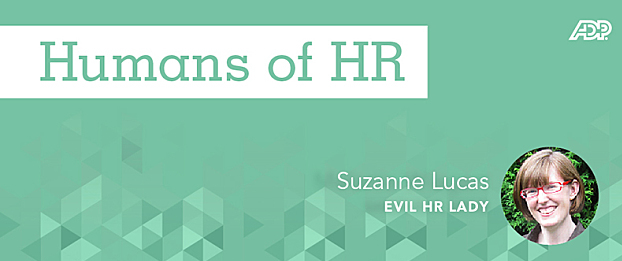"The Evil HR Lady" Is Out to Prove HR Isn't So Evil

Suzanne Lucas, author of the popular blog "Evil HR Lady," wants to show the world that the people who work in HR aren't exactly who you think they are.
Spend a few minutes talking to "The Evil HR Lady" and you'll notice one thing right away: she's not really evil. In fact, Suzanne Lucas is nice, really nice. You'll also quickly discover that "Evil HR Lady" — the name of her blog on HR practices — is a play on words to debunk the oft-held theory that human resources employees are, well, evil.
Lucas' advice on everything from starting an HR department in a small business to dealing with sexual harassment in the office positions her as a force of good. She aims to make HR relatable and seem not so bad. "Nobody likes their HR department," she says in a telephone interview from her home office in Basel, Switzerland. "Let's face it: There are lots of things that HR does that are super dumb."
But HR also does a lot of smart things, Lucas says, and she hopes readers of her blog will realize human resources can play a vital role in the growth of an organization. HR isn't always out to write up an employee for violating a company policy, she adds.
Lucas doesn't hesitate to provide HR leaders with candid feedback, such as how to create a better marijuana policy and whether cutting hourly pay by $16 per hour is legal. "One of my mantras is the way people hire," Lucas says. "Organizations feel they should treat candidates poorly, and they do. This phenomenon of bringing people in for a third or fourth interview and then just ghosting them is global. It happens in small companies and big ones. I can't figure out why senior HR people justify abruptly ending a conversation with a candidate. It happens all the time, and it is bad PR."
A Utah native, Lucas works as a freelance writer in Switzerland, where she moved almost nine years ago. Her writing is informed by the 10 years she previously worked in corporate HR. Her first job, as an analyst for two Wegmans stores in New York and New Jersey, was an experience that still makes her smile. It was her big break into an industry for which she had no background.
Lucas earned bachelor's and master's degrees in political science and was on her way to a doctorate when she realized "no one was hiring political scientists," she says. Still, she wanted to teach in some way, and saw an opportunity to train in HR. After two temporary jobs, a Wegmans manager who had to implement analytics technology told Lucas, "You are totally unqualified for the job but are the only person who knows anything about statistics," she recalls.
Lucas loved how Wegmans requires all corporate executives to work in stores with front-line employees. She worked the fish counter and made pizza. "It was an intense training experience that teaches you all sides of the business," she says. But after 18 months, Lucas reluctantly left Wegmans. She wanted to move up the ladder and wasn't ready to work weeknights and weekends.
Lucas next landed at the pharmaceutical company Wyeth, where she held a variety of positions over nine years. She worked as the Manager of HR Information Delivery and was responsible for approving raises for 30,000 employees. "I got to approve my raise and my boss' raise," she says while chuckling. "I also found out my boss was getting promoted before she did."
Her next position wasn't as fun. She worked as a labor and employment law consultant for Wyeth as the organization let go 4,000 employees. "You can't make a mistake laying off a person," she says. "We had a seven-step process to make sure it was 100-percent accurate. That's something I can say we did right. We treated everyone compassionately."
Her husband, Jason Lucas, got a job offer just as Pfizer acquired Wyeth, and it seemed as good a time as any to follow his career path to Switzerland. The couple have a 14-year-old daughter and nine-year-old son. Lucas freelances so she can arrange her 20-hour-a-week schedule around her kids' extracurricular activities and schooling, which stops each day in Switzerland for 90 minutes so children can go home for lunch. On weekends, she directs the music for the church choir and plays piano.
A typical day sees Lucas focusing on one article at a time but also scanning social media, the web and emails sent to her "Evil HR Lady" blog to generate story ideas. She envisions focusing articles on AI and talent management in the near future. Both areas will influence how organizations recruit and retain workers, she says. "There's a lot of talk about AI, with everybody saying this will solve all of our problems," she says. "But it won't if you're treating your people badly. You'll continue to have the same problems you have now. Sure, there are things you will find useful about the technology. You can use statistical analysis to find the best people to hire, for example. But on the human side, you have to make a conscious decision to treat people the right way."
Those employees can make a difference as long as they're not viewed solely as immutable assets, she says. "When we refer to hiring, we refer to talent recruiting. But the underlying implication is people come with the talent or they don't, and that's the wrong way to look at it. We need to look at employees' potential and willingness to work hard. If we're not willing to work with people and train them, our growth is limited.
Stay up-to-date on the latest workforce trends and insights for HR leaders: subscribe to our monthly e-newsletter.



